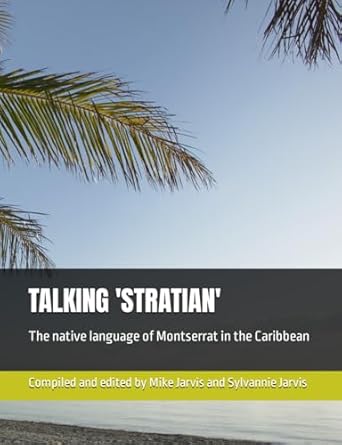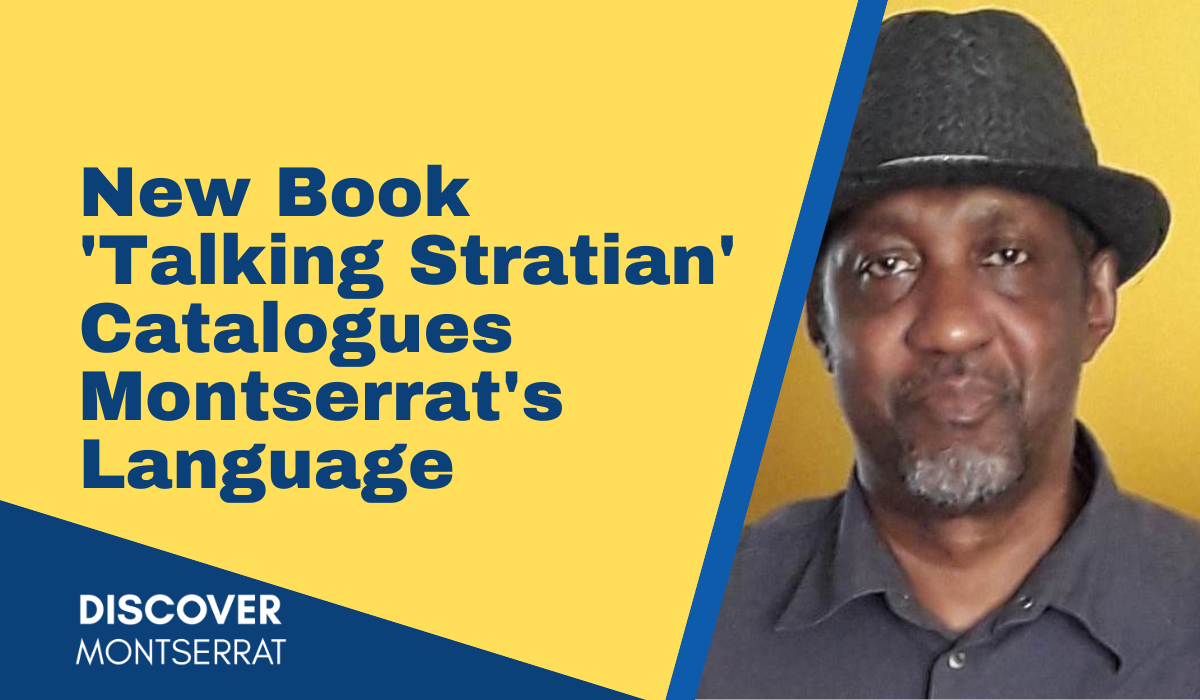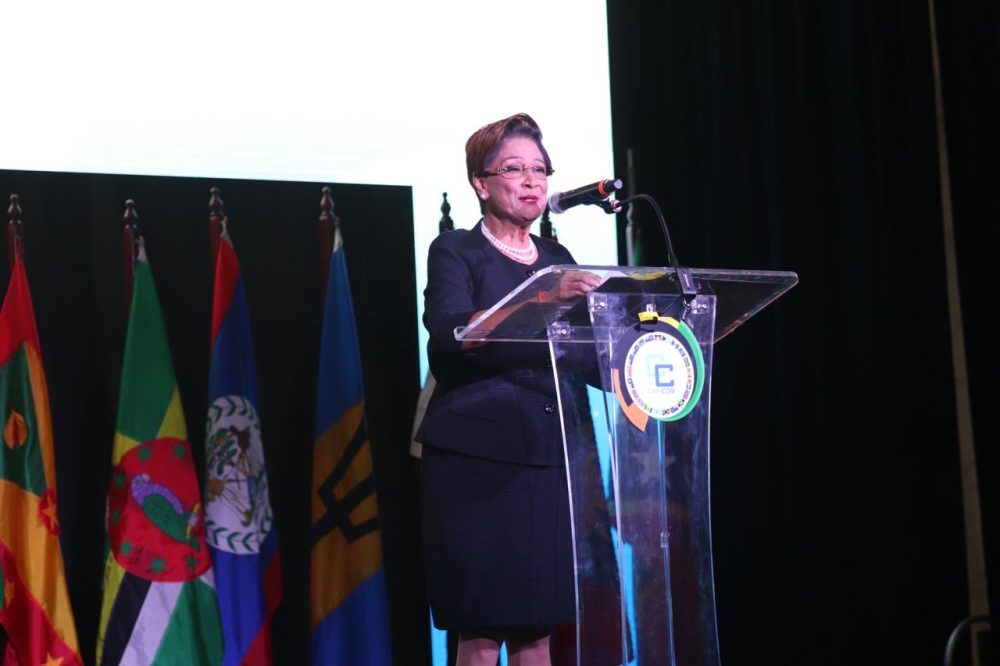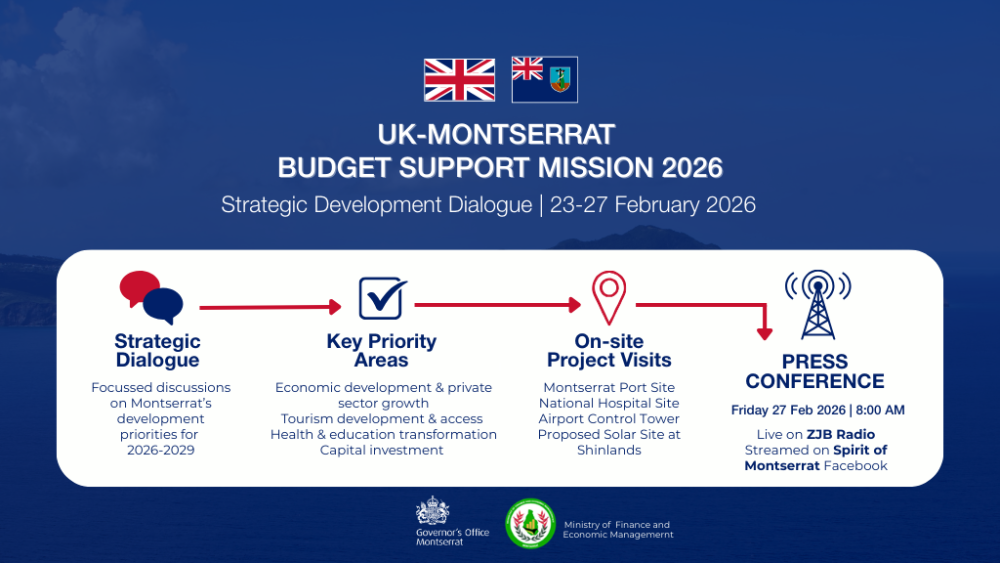Talking Stratian, a new book from the Mike & Sylvannie Jarvis which captures Montserrat’s unique language, has been released.
Mike, a former BBC journalist told Discover Montserrat the book came about as he and Sylvannie, his wife of 34 years were “chatting in ‘Stratian’ and our daughter hardly had a clue what we were on about. There have also been some online chats where the words and phrases were evoking as much memories about life in Montserrat back in the day as much as recalling the terms themselves.”
 The process of the book coming to life was like “Town and country!”, he explained with a laugh. “There were things that she would say and it was like a foreign language to me. And vice versa. I had no idea what a Jack Tumpy was. I thought it was a person. It’s a river fish that they used to catch. Likewise she’d never heard of kataflam.
The process of the book coming to life was like “Town and country!”, he explained with a laugh. “There were things that she would say and it was like a foreign language to me. And vice versa. I had no idea what a Jack Tumpy was. I thought it was a person. It’s a river fish that they used to catch. Likewise she’d never heard of kataflam.
“Fortunately for me she is a really good teacher and guided me through the phonetics when I could not figure out how to spell certain words. As our language has largely been in the oral tradition down through the ages without any conventional spelling formats, that was quite a challenge,” he shared about working with Sylvannie, a teacher.
Talking Stratian has the basic set up of a dictionary. “I realised that a basic glossary would not suffice for what I had in mind, so it turned out to be more time-consuming and extensive. That took months of jutting things down randomly then organising them into alphabetical order. I also started listening to myself a lot. Our language comes naturally so we just take it for granted. But then I or Sylvannie would say something and it was like: “Did you write that down?””
The process of deciding what words and phrases to include was also an extensive activity. “I found out doing the research that many of the words that we thought were peculiar to Montserrat are in use elsewhere. A lot of the research went into cross-referencing to determine etymology, difference in usage and how immigration, historical ancestral and cultural influences ‘informed’ our language. The plan was not to get to deeply academic but aspects of that could not be overlooked.”
“There’s a deeper study that’s warranted especially the Jamaica/Montserrat connection. I’ve been able to find some information which links plantation ownership in the two islands and people from specific regions in Ghana and Nigeria in particular which seems to account for more Akan influences in our accent and language than say Yoruba. Much more research and verification” is needed but it’s quite fascinating.
“‘Stratian’; that’s my label in the absence of a ‘brand’ that identifies our language. I’ve been asked so many times while speaking our language, if I’m talking Jamaican,” explained Mike. “I do not agree with the term Montserrat English – despite Arrow’s excellent song that’s as relevant now as it was in 1975. Our language is not second class to English. Not do I subscribe to calling it a dialect. A dialect of what language. It’s not substandard. It’s a fully functioning native language/mother tongue.
“In the book I refer to the UNESCO convention on Mother Tongues. Like Papiamento which is taught in Curacao, Kweyol which is celebrated in Dominica and St Lucia, Sranan Tongo in Suriname, the global impact of the Jamaican lexicon, let’s elevate and celebrate our languages. We are multi-lingual,” he declared.
Talking Stratian is just over 100 pages and available in paperback.
Book description – Stratian, the native language of the people of Montserrat in the Caribbean, is a vibrant vernacular of words and phrases that describe and illustrate almost every imaginable situation.
Like all other languages, ‘Stratian’ continues to evolve. It’s live, dynamic and adaptable. New words and phrases continue to emerge and merge into this wonderful mosaic. It’s a veritable melting pot of locally created, imported, adopted and adapted elements of West African, English, Irish, and liberally sprinkled and seasoned with flavourings of other Caribbean words and phrases, especially from Antigua, Trinidad…and Jamaica. (There’s a unique historical and cultural connection between Montserrat and Jamaica).
With the same resilience that Montserrat is demonstrating as it fights to bounce back from a series of devastating eruptions of the Soufriere Hills volcano, so too is the local lexicon of this idyllic paradise island striving to stay alive. Evidence of that can be seen in a resurgence of the Stratian mother tongue in written form; driven in part by social media, the publication of several books, and dramatic productions.
This book is part of that ‘Stratian’ renaissance.
Discover more from Discover Montserrat
Subscribe to get the latest posts sent to your email.




